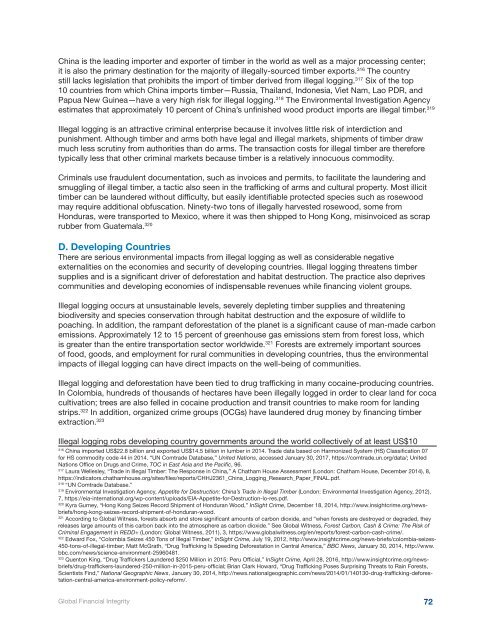Transnational Crime and the Developing World
Transnational_Crime-final
Transnational_Crime-final
You also want an ePaper? Increase the reach of your titles
YUMPU automatically turns print PDFs into web optimized ePapers that Google loves.
China is <strong>the</strong> leading importer <strong>and</strong> exporter of timber in <strong>the</strong> world as well as a major processing center;<br />
it is also <strong>the</strong> primary destination for <strong>the</strong> majority of illegally-sourced timber exports. 316 The country<br />
still lacks legislation that prohibits <strong>the</strong> import of timber derived from illegal logging. 317 Six of <strong>the</strong> top<br />
10 countries from which China imports timber—Russia, Thail<strong>and</strong>, Indonesia, Viet Nam, Lao PDR, <strong>and</strong><br />
Papua New Guinea—have a very high risk for illegal logging. 318 The Environmental Investigation Agency<br />
estimates that approximately 10 percent of China’s unfinished wood product imports are illegal timber. 319<br />
Illegal logging is an attractive criminal enterprise because it involves little risk of interdiction <strong>and</strong><br />
punishment. Although timber <strong>and</strong> arms both have legal <strong>and</strong> illegal markets, shipments of timber draw<br />
much less scrutiny from authorities than do arms. The transaction costs for illegal timber are <strong>the</strong>refore<br />
typically less that o<strong>the</strong>r criminal markets because timber is a relatively innocuous commodity.<br />
Criminals use fraudulent documentation, such as invoices <strong>and</strong> permits, to facilitate <strong>the</strong> laundering <strong>and</strong><br />
smuggling of illegal timber, a tactic also seen in <strong>the</strong> trafficking of arms <strong>and</strong> cultural property. Most illicit<br />
timber can be laundered without difficulty, but easily identifiable protected species such as rosewood<br />
may require additional obfuscation. Ninety-two tons of illegally harvested rosewood, some from<br />
Honduras, were transported to Mexico, where it was <strong>the</strong>n shipped to Hong Kong, misinvoiced as scrap<br />
rubber from Guatemala. 320<br />
D. <strong>Developing</strong> Countries<br />
There are serious environmental impacts from illegal logging as well as considerable negative<br />
externalities on <strong>the</strong> economies <strong>and</strong> security of developing countries. Illegal logging threatens timber<br />
supplies <strong>and</strong> is a significant driver of deforestation <strong>and</strong> habitat destruction. The practice also deprives<br />
communities <strong>and</strong> developing economies of indispensable revenues while financing violent groups.<br />
Illegal logging occurs at unsustainable levels, severely depleting timber supplies <strong>and</strong> threatening<br />
biodiversity <strong>and</strong> species conservation through habitat destruction <strong>and</strong> <strong>the</strong> exposure of wildlife to<br />
poaching. In addition, <strong>the</strong> rampant deforestation of <strong>the</strong> planet is a significant cause of man-made carbon<br />
emissions. Approximately 12 to 15 percent of greenhouse gas emissions stem from forest loss, which<br />
is greater than <strong>the</strong> entire transportation sector worldwide. 321 Forests are extremely important sources<br />
of food, goods, <strong>and</strong> employment for rural communities in developing countries, thus <strong>the</strong> environmental<br />
impacts of illegal logging can have direct impacts on <strong>the</strong> well-being of communities.<br />
Illegal logging <strong>and</strong> deforestation have been tied to drug trafficking in many cocaine-producing countries.<br />
In Colombia, hundreds of thous<strong>and</strong>s of hectares have been illegally logged in order to clear l<strong>and</strong> for coca<br />
cultivation; trees are also felled in cocaine production <strong>and</strong> transit countries to make room for l<strong>and</strong>ing<br />
strips. 322 In addition, organized crime groups (OCGs) have laundered drug money by financing timber<br />
extraction. 323<br />
Illegal logging robs developing country governments around <strong>the</strong> world collectively of at least US$10<br />
316<br />
China imported US$22.8 billion <strong>and</strong> exported US$14.5 billion in lumber in 2014. Trade data based on Harmonized System (HS) Classification 07<br />
for HS commodity code 44 in 2014. “UN Comtrade Database,” United Nations, accessed January 30, 2017, https://comtrade.un.org/data/; United<br />
Nations Office on Drugs <strong>and</strong> <strong>Crime</strong>, TOC in East Asia <strong>and</strong> <strong>the</strong> Pacific, 96.<br />
317<br />
Laura Wellesley, “Trade in Illegal Timber: The Response in China,” A Chatham House Assessment (London: Chatham House, December 2014), 8,<br />
https://indicators.chathamhouse.org/sites/files/reports/CHHJ2361_China_Logging_Research_Paper_FINAL.pdf.<br />
318<br />
“UN Comtrade Database.”<br />
319<br />
Environmental Investigation Agency, Appetite for Destruction: China’s Trade in Illegal Timber (London: Environmental Investigation Agency, 2012),<br />
7, https://eia-international.org/wp-content/uploads/EIA-Appetite-for-Destruction-lo-res.pdf.<br />
320<br />
Kyra Gurney, “Hong Kong Seizes Record Shipment of Honduran Wood,” InSight <strong>Crime</strong>, December 18, 2014, http://www.insightcrime.org/newsbriefs/hong-kong-seizes-record-shipment-of-honduran-wood.<br />
321<br />
According to Global Witness, forests absorb <strong>and</strong> store significant amounts of carbon dioxide, <strong>and</strong> “when forests are destroyed or degraded, <strong>the</strong>y<br />
releases large amounts of this carbon back into <strong>the</strong> atmosphere as carbon dioxide.” See Global Witness, Forest Carbon, Cash & <strong>Crime</strong>: The Risk of<br />
Criminal Engagement in REDD+ (London: Global Witness, 2011), 3, https://www.globalwitness.org/en/reports/forest-carbon-cash-crime/.<br />
322<br />
Edward Fox, “Colombia Seizes 450 Tons of Illegal Timber,” InSight <strong>Crime</strong>, July 19, 2012, http://www.insightcrime.org/news-briefs/colombia-seizes-<br />
450-tons-of-illegal-timber; Matt McGrath, “Drug Trafficking Is Speeding Deforestation in Central America,” BBC News, January 30, 2014, http://www.<br />
bbc.com/news/science-environment-25960481.<br />
323<br />
Quenton King, “Drug Traffickers Laundered $250 Million in 2015: Peru Official,” InSight <strong>Crime</strong>, April 28, 2016, http://www.insightcrime.org/newsbriefs/drug-traffickers-laundered-250-million-in-2015-peru-official;<br />
Brian Clark Howard, “Drug Trafficking Poses Surprising Threats to Rain Forests,<br />
Scientists Find,” National Geographic News, January 30, 2014, http://news.nationalgeographic.com/news/2014/01/140130-drug-trafficking-deforestation-central-america-environment-policy-reform/.<br />
Global Financial Integrity<br />
72


